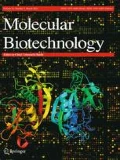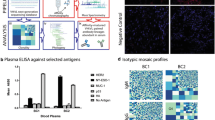Abstract
Medullary breast carcinoma (MBC) is a relatively rare malignancy with heavy lymphocytic infiltration that despite cytologically anaplastic features and high mitotic index has more favorable prognosis than other types of breast cancer. Lymphocytic infiltration of tumors reflects ongoing immune response against tumor antigens which could represent a great interest as potential targets for cancer immunotherapy. The search for MBC antigens by SEREX methodology has not been successful due to a very high titer of false positive clones, representing immunoglobulin genes. Here, we describe a novel approach for generating cDNA expression libraries from MBC tumor samples which are depleted of IgG cDNA clones and, therefore, are suitable for the identification of novel tumor-associated antigens (TAA) by SEREX approach. Modified methodology allowed us to isolate a panel of known and novel TAA which are currently under further investigation.



Similar content being viewed by others
References
Finn, O. J. (2008). Cancer immunology. New England Journal of Medicine, 358, 2704–2715.
Mattes, M. J., Look, K., Furukawa, K., Pierce, V. K., Old, L. J., Lewis, J. L., et al. (1987). Mouse monoclonal antibodies to human epithelial differentiation antigens expressed on the surface of ovarian carcinoma ascites cells. Cancer Research, 47, 6741–6750.
Boon, T., Couli, P. G., & Van den Eynde, B. (1997). Tumor antigens recognized by T cells. Immunology Today, 18, 267–268.
Boon, T. (1993). Tumor antigens recognized by cytolytic T lymphocytes: present perspectives for specific immunotherapy. International Journal of Cancer, 54, 177–180.
Parkhurst, M. R., Fitzgerald, E. B., Southwood, S., Sette, A., Rosenberg, S. A., & Kawakami, Y. (1998). Identification of a shared HLA by A0201-restricted T-cell epitope from the melanoma antigen tyrosinase-related protein 2 (TRP2). Cancer Research, 58, 4895–4901.
Wang, R. F., Wang, X., Atwood, A. C., Topalian, S. L., & Rosenberg, S. A. (1999). Cloning genes encoding MHC class II-restricted antigens: mutated CDC27 as a tumor antigen. Science, 284, 1351–1354.
Gunawardana, C. G., & Diamandis, E. P. (2007). High throughput proteomic strategies for identifying tumour-associated antigens. Cancer Letters, 249, 110–119.
Sahin, U., Tureci, O., & Pfreundschuh, M. (1997). Serological identification of human tumor antigens. Current Opinion Immunology, 9, 709–716.
Old, L. J. (2008). Cancer vaccines: An overview. Cancer Immunity, 8(Suppl 1), 1.
Ridolfi, R. L., Rosen, P. P., Port, A., Kinne, D., & Mike, V. (1977). Medullary carcinoma of the breast: a clinicopathologic study with 10 year follow-up. Cancer, 40, 1365–1385.
Kuroda, H., Tamaru, J., Sakamoto, G., Ohnisi, K., & Itoyama, S. (2005). Immunophenotype of lymphocytic infiltration in medullary carcinoma of the breast. Virchows Archiv, 446, 10–14.
Hansen, M. H., Nielsen, H. V., & Ditzel, H. J. (2002). Translocation of an intracellular antigen to the surface of medullary breast cancer cells early in apoptosis allows for an antigen-driven antibody response elicited by tumor-infiltrating B cells. Journal of Immunology, 169, 2701–2711.
Kotlan, B., Simsa, P., Teillaud, J. L., Fridman, W. H., Toth, J., McKnight, M., et al. (2005). Novel ganglioside antigen identified by B cells in human medullary breast carcinomas: the proof of principle concerning the tumor-infiltrating B lymphocytes. Journal of Immunology, 175, 2278–2285.
Hansen, M. H., Nielsen, H., & Ditzel, H. J. (2001). The tumor-infiltrating B cell response in medullary breast cancer is oligoclonal and directed against the autoantigen actin exposed on the surface of apoptotic cancer cells. Proceedings of the National Academy of Science, 98, 12659–12664.
Acknowledgments
This study was supported in part by a grant from the National Academy of Sciences of Ukraine and the UICC fellowship to carry out some experiments on this project at University College London (UCL), United Kingdom.
Conflicts of Interest Statement
The authors declare no competing interests.
Author information
Authors and Affiliations
Corresponding author
Rights and permissions
About this article
Cite this article
Kiyamova, R., Kostianets, O., Malyuchik, S. et al. Identification of Tumor-Associated Antigens from Medullary Breast Carcinoma by a Modified SEREX Approach. Mol Biotechnol 46, 105–112 (2010). https://doi.org/10.1007/s12033-010-9285-2
Published:
Issue Date:
DOI: https://doi.org/10.1007/s12033-010-9285-2




